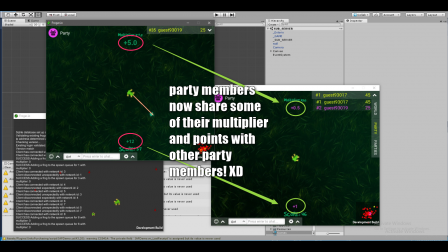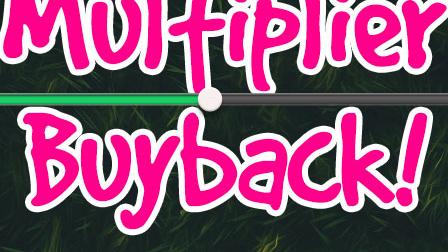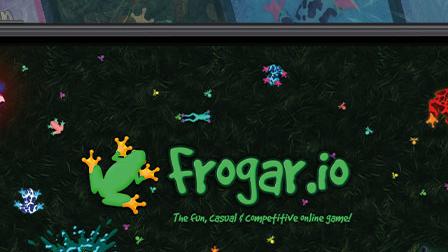
How To Improve The Retention Of Your Game
Posted on 25th April, 2024 by Donny SutherlandBeing a part of a number of Facebook groups and forums where developers share advice and feedback, one of the questions that was asked recently was how to actually improve the retention of a game, and also how to focus on retention during development. Like many indie developers, we had no idea of the importance of retention during the development of our first two games (frogar.io and race stars). We were extremely lucky to be approached by some highly experienced individuals when planning our third game, idle toss, and I thought it would be a good idea to share some tips that we have learned. Ultimately, retention is not something to be overlooked!
What Is Retention?
We can get a general idea by looking a the definition of the word:
the continued possession, use, or control of something.
"the retention of direct control by central government"
Looking at how this relates to games however, it refers to the percentage of players that continue to play your game after a length of time. The higher the retention of your game, the more likely that it is that a player will still be playing it after days or weeks, which is very important for ad-funded games as I will explain later.
When Should I Focus On Retention?
It's important to note that this article is mainly only relevant to games that are funded by ads, which pretty much narrows things down to mobile games, and even more-so to the casual market within mobile games. Although retention shouldn't be overlooked, it is less important in games that are not funded in this way. But why is this?
We can answer this question by thinking about the purpose of ad-funding as a monetization option. Ultimately at some point, various app/game stores became massively saturated, due to the development process of games becoming much more accessible, and also much cheaper. Once this started to happen, getting people to install your game became much harder because no-one wanted to commit to anything when there were millions of potentially other enjoyable games to choose from. The ad-funded option allowed us to solve this problem by making it much easier for players to play our games without committing, whilst also still providing compensation to the developer.
Retention plays a massive part in the above because players don't have to commit to your game, and in-fact players don't want to commit to your game. So, in order for your game to be successful you have to drive as many people to your game as you can, and do absolutely everything that you can to keep them there. Players are always aware that there are thousands of other potential games available to them that they might enjoy, so if you don't keep their interest, they will go somewhere else.
In addition to the above, it's also important to know when to focus on retention. Retention isn't something that you can slap onto a game after it has been developed, it is something that you have to incorporate into your planning stages, and into early development. You will want to make sure that any and all features of your game have the potential to perform well in terms of retention, as I will discuss later.
But... Why Focus On Retention?
This is pretty much the final question that we need to ask, and the answer is simple. An ad-funded game needs thousands of active and regular players before it can start making a few dollars, let-alone a sizable amount of money. So your aim is to get as many people to install your game as possible. There are various ways to do this, however the most efficient way to get consistent installers into your game in a way that can be analyzed is through paid installs. This is normally done using something like facebook ads, or google adwords, where you will set up your own ad campaign to advertise your game, specifically for the purpose of driving installs to it. Depending on the type of game (mainly its competitors), you can expect to pay anywhere between $0.10 to $0.50 for each install of your game.
Retention becomes important here because you want to be sure that you are making a profit on the amount that you are paying to get players into your game. A simple example would be: you pay $0.20 for an install, they play for 5 minutes and never play again versus another $0.20 install that sticks around for 7 days, watching hundreds of ads and maybe even purchasing an in-app-purchase or two. The higher the percentage that you can get of people doing the latter, the larger your potential profit margins, hence the focus on retention.
Let's Get To It!
So knowing what retention is, when we should focus on it and why, it's time to start looking at how we focus on it. This is where things can get tricky because it ultimately comes down to psychology, and how well you can perceive things through the eyes of your potential players. Like anything though, it takes practice and the more time that you spend doing it, the better you will get at it.
Personally though, I like to think that implementing retention can be done in three thought processes, of which I will explain below.
1. The First 15 Seconds
It's a well-known fact that people make subconscious decisions about whether they like/dislike something within the first 15 seconds of being introduced to it. The important thing to note here is that it IS subconscious, which means that we don't tend to have any control over this. Everyone does it, and it's very natural.
When it comes to games, you have to bear in mind that your game is on a shelf along with millions of other potentially similar games, or more specifically - millions of other games that the player might enjoy. For this reason, it's crucially important that the player understands, enjoys and is playing the core part of your game within the first 15 seconds, otherwise they are very likely to think "meh, there's probably something better" and give up on it. To get to this point, avoid unnecessary blocking/pre-loading/tutorial screens that eat up those 15 seconds. Any screens that you must display, make sure that they are very simple. Avoid unnecessary buttons and visuals that could distract the player from understanding/enjoying/playing your game within that crucial 15 seconds.
Some developers may come to conclusions such as "I don't know how I can avoid a tutorial" or "I don't know how I can simplify the game in those first 15 seconds". In some cases it's not possible, which may mean that your game is too complex to perform well in terms of retention. Ultimately, I would recommend to think very long and hard about how you can try an incorporate the above steps, as they are almost always possible, you just have to think cleverly about how to incorporate them.
It's also worth noting that when talking about understanding, enjoying, and playing here's what I mean:
- Understanding the basic concept of your game requires that the core concept is simple, intuitive or can be very easily explained with suggestive visuals, rather than blocking screens/tutorials. If you can't seem to do this with your core concept, think about how you can simplify it.
- Making your game enjoyable is done by making it feel nice to play. Usually this can be done by making the game fun, addictive, comical or any other positive feeling. It's crazily important to understand that challenging/difficult gameplay isn't what we are talking about here. Although some may find this enjoyable, the casual mobile gaming market don't.
- When we refer to being able to play your game within the first 15 seconds, we simply mean to be actually playing the core concept of the game, rather than being in some menu screen etc.
2. The Initial Hook
With the first 15 seconds covered, you know that you've done all that you can to try and get the player to understand, enjoy and play your game. The next focus is on that all-important D1 (day 1) retention, which is the percentage of players that are still playing your game after 1 day. Most publishers expect this to be around 50% for your game to be considered profitable for ad-funded games, so your goal is for 50% of your players (or more) to be playing after day 1.
The key thing here is the progression. If your game doesn't have a progression and is immediately difficult/frustrating then you can kiss your retention goodbye. If however you can make the game very easy at the beginning, avoiding any chance of the player becoming frustrated (which is why challenging/difficult games don't work in the casual mobile market) then you will bode well. The ultimate goal here is not to show the player every aspect of the game, or how hard it can get, but to simply make them feel like they can master the game, and that they are really good at it. If you can do this, you can effectively make any progressive game do very well on D1, it's just a case of making sure that there are zero chances of the player becoming frustrated during the early stages of the game.
3. Keeping Them Hooked
Most publishers only look as far as D7 (day 7) to determine the potential value of a game that is ad-funded. It varies here, but aiming for something like 20% retention at D7 is a good idea.
So the next step is to ultimately keep them hooked. This can be a little more tricky because it's largely down to the type of game, and there are a large number of variables at play. However, the way I would suggest to look at it is look at the parts of your game that you haven't yet introduced, and do the exact same thing you did in the first two steps with these new parts. For example, if you game has some sort of reward/unlock mechanic, where the player is rewarded or can unlock items, make sure that within the first 15 seconds of introducing this new part that the player understands, enjoys, and can play them. Also make sure that the player feels like they can master it, and that they are really good at it. The pace that you introduce these new parts, or that your game progresses is really important. You want to make sure that the game never surpasses the player's abilities. For example, don't make the game get too hard too fast, otherwise the player will stop feeling like they are good at the game and can master it.
And that's pretty much it! I hope you find this article helpful. Feel free to leave any questions in the comments section below.
Posted in Game Development / Tips & Tricks
Tags: game development, games, general advice, industry secrets, retention, tips & tricks
Related Posts

Frogar.io - 2017 Christmas Update: Franta and Farting Frogs!
2017 has been a pretty interesting year for us! After rel... (read more)
Frogar.io - The Party Just Got Better!
This week has been another busy week at Frogar.io HQ. Wit... (read more)
Frogar.io - Come Join The Party!
This last weekend we implemented our first-ever community... (read more)
Frogar.io - New Species Discovered: Frombie! Halloween Special!
Here at Frogar.io HQ we have been getting ready for a ver... (read more)
Frogar.io - Multiplier Madness!
Over the past few months, things have been calming down q... (read more)
Frogar.io - Now Available on iOS!
For many months now, many of you have been asking us when... (read more)
Frogar.io - New Species Discovered: Frometeor!
It was a quiet night at Frogar.io HQ. The crickets were c... (read more)
Frogar.io - New Species Discovered: Frisk!
Please Note! this stream took place on Friday the 1st of ... (read more)
Frogar.io - New Species Discovered: Frunicorn!
Recently at Frogar.io HQ, many of us had been talking abo... (read more)Search Posts
Categories
Looking for reviewers!
Are you a youtuber or content writer interested in reviewing one of our games? Get in touch!
Games | Blog | Forum | Wiki | Partners | Contact Us
© Copyright Jadoku 2024All right reserved.